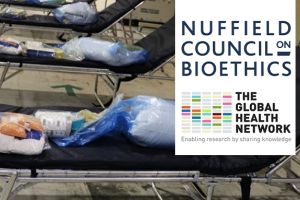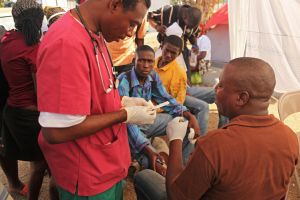Press Release
Council announces new project looking at research in global health emergencies
The Nuffield Council on Bioethics is embarking upon a major new inquiry to explore how research may be conducted ethically in the context of global health emergencies.
The project, informed by a Council-run workshop held in December 2016, will take into account the diverse forms that such emergencies can take – for example an infectious disease outbreak, conflict, or natural disaster – as well as the diversity of health-related research involved and some of its associated challenges – including data-sharing and the implications of developments in genomics. Such health emergencies may be ‘global’ in the sense that their effects extend beyond national boundaries, or that the response required is global in nature, or both.
The project’s working group will be chaired by Professor Michael Parker, Director of the Wellcome Centre for Ethics and Humanities, and the Ethox Centre, at the University of Oxford. He said: “I am delighted to chair this important project. Recent global health emergencies, notably the Ebola and Zika outbreaks, have highlighted how uncertainties about what is ethically acceptable during emergencies can impede progress of potentially valuable research, or alternatively contribute to the risks of unethical practice passing undetected. Such a situation can mean that frontline workers are left to make their own decisions, unsupported, about what is ethically acceptable, often in very difficult circumstances.“
Although progress has been made in some areas, there is still an urgent need for comprehensive ethical analysis to support an approach to future research that both recognises the complex relationships between research and other essential services in global health emergencies, and supports cooperation between interested parties.”
Hugh Whittall, Director of the Council, said: “We believe that more work is needed to work out what, if anything, is morally different about an emergency, and how that affects what research can be conducted, and in what ways. This project could play a valuable role in achieving greater clarity as to what constitutes ethical research conduct in global health emergencies.”
The Council will be seeking to appoint a number of members to the working group from outside Europe to ensure it has a global perspective, as it did for its 2002 project on Healthcare related research in developing countries.In the context of research in infectious disease outbreaks and in response to other emergencies, the project will explore key questions, including:
- whether there is anything morally distinct about an ‘emergency’ that could justify different ethical requirements for research;
- the extent to which the research, care, and public health elements of emergency responses – each of which have distinct ethical and regulatory approaches – may intersect and overlap, demanding a more holistic ethical framework; and
- ongoing uncertainty over the roles and responsibilities of major stakeholders in resolving many of these ethical challenges on the ground.
See the project’s draft Terms of Reference.
Notes
The Nuffield Council on Bioethics is an independent body that has been advising policy makers on ethical issues in bioscience and medicine for more than 25 years. As well as being a key UK partner on international networks of advisory bodies, the Council has an international reputation for advising policy-makers and stimulating debate in bioethics. The Council is funded by the Nuffield Foundation, the Medical Research Council, and Wellcome.
The new project is expected to get underway in early 2018 and with publication due in 2019. Members of the inquiry’s working group will be announced in due course.A note of the 2016 Council workshop, a longer background paper that informed the workshop, and a short briefing note that summarised key challenges that emerged both from the workshop and background research are available here.
The Council’s past work on Healthcare related research in developing countries in 2002 included working group members from Ghana, Bangladesh, The Gambia, and Uganda.The Council will be seeking diverse input to this new inquiry through evidence-gathering, consultation, peer-review and working group membership. Expressions of interest should be addressed to ghe@nuffieldbioethics.org.
Contact
Shaun Griffin
Communications lead
Nuffield Council on Bioethics
Phone: 0207 323 6232
Mobile: 07551 159670


Share